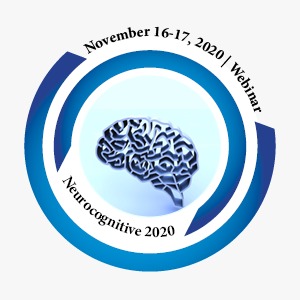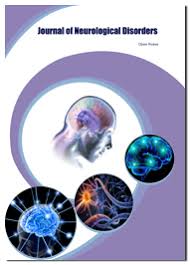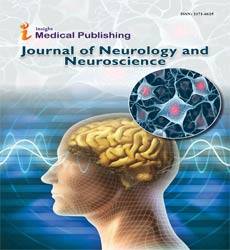Theme: Scientific gathering to unleash the new horizons in neurocognitive study
Neurocognitive 2020
Join us for 27th Cognitive Neuroscience Congress
Neurocognitive 2020 International Conference invites all the participants from all over the world to attend the prestigious Scientific Conference on Cognitive Neurology during November 16-17, 2020 Via Webinar which encompass Keynote presentations, Oral Presentation, Poster presentations and Exhibitions. Neurocognitive 2020 is a global platform to discuss and learn about early detection as well as treatment, care based on Professional standards, and increased research to accomplish cure for all Neurological Disorder. The conference includes leading international experts in Neurocognitive hospitals specialists, doctors, research scholars and general practitioners form all over the world.
The World Congress on Advances in Neurocognitive Disorders and Therapeutics would be a stage for interconnecting National and Global specialists, scientists and chiefs both from the scholarly world and industry from everywhere throughout the world to trade their insight, skill and research developments in the field of Cognitive Neuroscience, Neurology ,TBI and Mental illness To accomplish this, it is vital to carry into a significant field of neurology with the novel investigations, which can spare a huge number of lives we Navigating the Future Advancements in Neurocognitive. So be a part of the team which shares the same vision and provides a prism of possibilities for the future.Cognitive Neuroscience Congress itself is an idiosyncratic discussion to bring forth the new approaches and also to unite recognized scholastics, concerned with neuroscience, Cognition, also in-field experts, Psychiatrists, Public well-being experts, researchers, scholarly researchers, industry specialists, researchers to trade about cutting edge research and innovations. The point to organize this conference is to give a stage to academicians and specialists with wide spectrum of disciplines to debate and deliberate on social change that is encompassed by innovation and technology.
Target Audience:
- Expert in Electrophysiological Studies
- Neurologists
- Neuro-physiotherapists
- Neuro-radiologists
- Cardiologists
- Experts in Tissue engineering
- Neuro-ophthalmologists
- Electro-physiologists
- Professors associated with neurology
- Psychiatrist
- Lecturers and Students from Academia in the research of Neurology
Track 1. Cognitive Health and Cognitive Development
Cognitive health refers to the health of the brain and its function wholly and solely. This deal with several types of functions such as: memory, judgment, intuition. In short, if cognitive disorders are there, it can take many forms. One of the common cognitive health related problems is a decrease in mental function, dementia, which generally develops in the later phase of life. Cognitive health decline naturally occurs while ageing but it is age-independent and can be found in any age group. Even, other health problems that are not age related also fall under the umbrella of cognitive issues. Like; depression is not necessarily age- related, same with brain injury or vitamin B12 deficiency.
- Drug overdose
- Stroke
- Stages of cognitive development
- Visual perceptions
- Language acquisition
- Bilingualism
- Whorf’s hypothesis
- Piaget’s theory
Track 2. Cognitive Psychology and Behavioral Psychology
Cognitive psychology involves the study of internal mental processes—all of the items that endure within your brain, together with perception, thinking, memory, attention, language, problem-solving, and learning. whereas it's a comparatively young branch of scientific discipline, it's quickly full-grown to become one in all the foremost fashionable subfields.There area unit varied sensible applications for this psychological feature analysis, like providing facilitate addressing memory disorders, increasing decision-making accuracy, finding ways that to assist folks get over brain injury, treating learning disorders, and structuring instructional curricula to reinforce learning.
Behavioral science, or behavioristic psychology, may be a theory suggesting that setting shapes human behavior. during a most simple sense, behavioural science is that the study and analysis of discernible behavior. This field of science influenced thought heavily throughout the center of the twentieth century.
- Mental processes
- Memory processes
- Physiological psychology
- Psychopharmacology
- Genetic mechanism
- Developmental mechanism
Track 3 . Clinical Neuroscience
Clinical neuroscience is a part of neuroscience that centers around the logical investigation of major instruments that underlie infections and issues of the cerebrum and focal sensory system. It looks to grow better approaches for conceptualizing and diagnosing such issues and at last of creating novel medicines. A clinical neuroscientist is a researcher who has specific information in the field. Not all clinicians are clinical neuroscientists. Clinicians and researchers - including therapists, nervous system specialists, clinical analysts, neuroscientists, and different authorities—utilize essential exploration discoveries from neuroscience when all is said in done and clinical neuroscience specifically to create demonstrative strategies and approaches to forestall and treat neurobiological issues. Such issues incorporate fixation, Alzheimer's ailment, amyotrophic horizontal sclerosis, uneasiness issues, consideration deficiency hyperactivity problem, chemical imbalance, bipolar turmoil, cerebrum tumors, wretchedness, Down condition, dyslexia, epilepsy, Huntington's infection, various sclerosis, neurological AIDS, neurological injury, torment, over the top urgent issue, Parkinson's illness, schizophrenia, rest issues, stroke and Tourette disorder. While nervous system science, neurosurgery and psychiatry are the primary clinical strengths that utilization neuroscientific data, different claims to fame, for example, intellectual neuroscience, neuroradiology, neuropathology, ophthalmology, otorhinolaryngology, anesthesiology and restoration medication can add to the control.
- Parkinson's illness
- Huntington's infection
- Alzheimer's ailment
Track 4 . Brain and nerve system disorders
Brain and nerve system issues are normal. These neurological issues incorporate different sclerosis, Alzheimer's malady, Parkinson's illness, epilepsy, and stroke, and can influence memory and capacity to perform day by day exercises. The cerebrum, spinal string, and nerves make up the sensory system. Together they control all the functions of the body. When something turns out badly with a piece of your sensory system, you can experience difficulty moving, talking, gulping, breathing, or learning. You can likewise have issues with your memory, detects, or moods.
A pediatric nervous system specialist is a specialist with (or learner specialist progressing in the direction of securing) mastery in diagnosing and dealing with the tremendous scope of neurological issues influencing youngsters and youngsters. Discover more about this sub-forte and its educational plan. Neuropharmacology distributes great, unique examination inside the control of neuroscience. The accentuation of Neuropharmacology is on the investigation and comprehension of the activities of known exogenous and endogenous substance operators on neurobiological procedures in the mammalian sensory system.
- Neuropharmacology
- Mammalian sensory system
Track 5 . Neurology and Neurology Disorders
Neurology is that the branch of drugs involved with the study and treatment of disorders of the systema nervosum. The systema nervosum may be a complicated, subtle system that regulates and coordinates body activities. it's 2 major divisions: Central nervous system: the brain and funiculus. Neurological problems are illnesses of the focal and fringe sensory system. At the end of the day, the mind, spinal line, cranial nerves, fringe nerves, nerve roots, autonomic sensory system, neuromuscular intersection, and muscles. These issues incorporate epilepsy, Alzheimer ailment and different dementias, cerebrovascular ailments including stroke, headache and other migraine problems, numerous sclerosis, Parkinson's infection, neuroinfections, mind tumors, horrible issues of the sensory system because of head injury, and neurological issues because of hunger.
- Neuroinfections
- Brain Tumors
Track 6 . Cognitive Dysfunction and Cognitive Disorders
Traumatic Brain Injury (TBI) is an interruption in the typical capacity of the cerebrum that can be brought about by a blow, knock or shock to the head, the head out of nowhere and fiercely hitting an article or when an item penetrates the skull and enters mind tissue. Awful mind injury regularly happens because of a serious games injury or auto crash. Quick or deferred side effects may incorporate disarray, hazy vision and trouble concentrating. Babies may cry determinedly or be crabby. Treatment may include rest, prescription and medical procedure.
Brain mapping is a lot of neuroscience strategies predicated on the planning of (organic) amounts or properties onto spatial portrayals of the (human or non-human) cerebrum bringing about guides. This procedure permits you to envision inside the mind and recognize obviously the sporadic brainwaves that cause neurological issues. From that mind map, a report is created for every patient that shows the zones of brokenness and the conventions prescribed to address them.
Track 7.TBI Traumatic brain injury and Brain mapping
Traumatic Brain Injury (TBI) is an interruption in the typical capacity of the cerebrum that can be brought about by a blow, knock or shock to the head, the head out of nowhere and fiercely hitting an article or when an item penetrates the skull and enters mind tissue. Awful mind injury regularly happens because of a serious games injury or auto crash. Quick or deferred side effects may incorporate disarray, hazy vision and trouble concentrating. Babies may cry determinedly or be crabby. Treatment may include rest, prescription and medical procedure.
Brain mapping is a lot of neuroscience strategies predicated on the planning of (organic) amounts or properties onto spatial portrayals of the (human or non-human) cerebrum bringing about guides. This procedure permits you to envision inside the mind and recognize obviously the sporadic brainwaves that cause neurological issues. From that mind map, a report is created for every patient that shows the zones of brokenness and the conventions prescribed to address them.
Track 8 Pediatric Neurology
Pediatric nervous system science or kid nervous system science alludes to a specific part of medication that manages the determination and the executives of neurological conditions in youngsters (babies), babies, kids and teenagers. Whereas Neuropharmacology is that the investigation of however medications influence cell add the sensory system, and also the neural elements through that they impact conduct. There area unit 2 principle elements of neuropharmacology: conduct and atomic.
Track 9 Neuroimaging
Neuroimaging or mind imaging is the utilization of different methods to either straightforwardly or in a roundabout way picture the structure, capacity, or pharmacology of the sensory system. It is a moderately new order inside medication, neuroscience, and brain science. Doctors who have practical experience in the exhibition and translation of neuroimaging in the clinical setting are neuroradiologists. Neuroimaging falls into two general classes:
Basic imaging, which manages the structure of the sensory system and the determination of gross (huge scope) intracranial sickness, (for example, a tumor) and injury.
Practical imaging, which is utilized to analyze metabolic infections and sores on a better scale, (for example, Alzheimer's sickness) and furthermore for neurological and psychological brain research exploration and building cerebrum PC interfaces.
Practical imaging empowers, for instance, the preparing of data by focuses in the mind to be envisioned legitimately. Such handling makes the included region of the mind increment digestion and "light up" on the output. One of the more disputable employments of neuroimaging has been investigating "thought distinguishing proof" or psyche perusing.
Cognitive genomics (or neurative genomics) is the sub-field of genomics relating to intellectual capacity in which the qualities and non-coding arrangements of a life form's genome identified with the wellbeing and movement of the mind are examined. Human insight has for some time been known to be under considerable hereditary control. With the total planning of the human genome, genome-wide affiliation contemplates (GWAS) for some, perplexing attributes have multiplied; in any case, the profoundly polygenic nature of knowledge has made the ID of the exact qualities that impact both worldwide and explicit psychological capacities more troublesome than foreseen.
Track 11 Neurogenetics
Neurogenetics examines the part of hereditary qualities in the turn of events and capacity of the sensory system. It thinks about neural qualities as phenotypes, and is mostly founded on the perception that the sensory systems of people, even of those having a place with similar animal groups, may not be indistinguishable. It is primarily dependent on the perception that the sensory systems of people, even of those having a place with similar animal groups, may not be indistinguishable. As the name suggests, it draws angles from both the investigations of neuroscience and hereditary qualities, centering specifically how the hereditary code a life form conveys influences its communicated characteristics. Changes in this hereditary arrangement can have a wide scope of impacts on the personal satisfaction of the person. Neurological illnesses, conduct and character are totally concentrated with regards to neurogenetics. The field of neurogenetics developed in the mid to late 1900s with progresses intently following headways made in accessible innovation. At present, neurogenetics is the focal point of much exploration using.
- Gene sequencing
- Statistical analysis
- Recombinant DNA
- Animal model assay
- Human research
- Genetic mutation
Scope and Importance
Psychological neuroscience is a subfield of neuroscience that reviews the natural cycles that underlie human discernment, particularly with respect to the connection between cerebrum structures, movement and intellectual capacities. The motivation behind it is to decide how the cerebrum capacities and accomplishes execution. Cognitive neuroscience investigates the emergence of psychological feature perform from the physical and chemical activity of neurons within the brain. Active representations within the brain encompass patterns of neural activity, process takes place through the propagation of activity via stimulative and restrictive connections, and learning and memory arise primarily through the modification of connections.
Universities associated with Neuroscience in Globe are:
- University of Oxford
- Harvard University
- University Of Cambridge
- Stanford University
- University College London
- Princeton University
- University of California
- Yale University
- Cornell University
- Indiana University
- Johns Hopkins University
- The University of California at Irvine
- University of California at San Diego
- University of Amsterdam
- University of North Carolina
- Alfaisal University
- Mansoura University
- King Abdulaziz University
- Assiut University
- University of Edinburgh
- University of Manchester
- Cardiff University
- University of Vermont
- University of Amsterdam
- Ghent University
- Maastricht University
Universities associated with Neuroscience in the Middle East are:
- Heriot University
- University of Bucharest
- International Medical University
- University of the West Timisoara
- Sunway University
- University of Malaya
- Dimensions International College
- National University of Singapore
Major Neuroscience Hospital around the Globe:
- Emirates Hospital
- Neuro Spinal Hospital
- Medcare Hospital
- Medcare Orthopaedics & Spine Hospital
- Wooridul Spine Center
- American Center for Psychiatry and Neurology
- Al Amal Hospital
- American Hospital Dubai
Major Neuroscience Hospital around the Middle East:
- Dr Gebrane Psychiatry
- The Behman Hospital
- Heliopolis Psychiatric Hospital (Al-Matar)
- Serene Psychiatry Hospital
- Herzog Medical Center
- American Center for Psychiatry & Neurology - Sharjah
- American Center for Psychiatry and Neurology
- Psychiatric Hospital
- MIND Clinics
- Near East University Hospital
Major Neuroscience Hospital around the UAE:
- Govt. Psychiatry Hospital
- Ram Psychiatry Hospital
- Helwan Psychiatry Hospital
- Clinique Axium
- Royal Edinburgh Hospital
- St. Patrick's University Hospital
- Metro Psych Facility
- DelaCerna Hospital
- Aged Psychiatry Services
- The Ashburn Clinic
- Peace Health Ketchikan Medical Center
- Royal Alexandra Hospital Psychiatry
- Amager Hospital
- World Brain Center Hospital
Universities associated with Neuroscience in UAE are:
- King Saud University
- United Arab Emirates University
- King Abdulaziz University
- Ain Shams University
The “25th Cognitive Neuroscience Congress 2018”was organized November 12-13, 2018 at Dubai UAE. With the support and contribution of the Organizing Committee Members, we successfully hosted the event at the conference venue.
Firstly we must thank you for trusting us US and collaborating at Neurology Congress 2018 conference, a worldwide platform to debate varied vital aspects of Neurology and neurobiology. There ar infinite reasons to increase our feeling to you for creating the Neurology Congress 2018 outstanding conference. we tend to could not have done it while not your continuous support and believe towards our organization, that reciprocally created to realize Neurology Congress 2017 new height within the field of Neurology and neurobiology. The conference was marked by the attending of young and sensible researchers, business delegates and gifted student communities representing over fifty countries, WHO have driven this event into the trail of success.
The conference was organized around the theme “Scientific gathering to unleash the new horizons in neurocognitive study “ the event planted a firm relation of coming methods within the field of Neurology with the scientific community. The abstract and applicable data shared, also will foster structure collaborations to nurture scientific accelerations.
The conference was initiated with a warm welcome note from our Moderator and followed by Keynote sessions. We would like to convey the great appreciation to Hadi Eltonsi from Cairo Unviersity, Egypt, and Javier Fiz Perez from European University of Rome, Italy who contributed a major part to the success of this event as the Honorable moderators for the conference.
The highlights of the meeting were the enlightening keynote lectures from:
- Hadi Eltonsi Cairo Unviersity, Egypt
- Javier Fiz Perez European University of Rome, Italy
- Khurram Sadiq, Greater Manchester Mental Health NHS Foundation, UK
- Efthymios Paptzikis, Canadian University Dubai, UAE
- Jeffrey Rediger, McLean Hospital, USA
Neurology Congress 2018 would also like to thank the following speakers for their splendid presentations on their research.
- Gopika Govindan, Neuropedia Children’s Neuroscience Center, UAE
- Najiha Syeda, Dwight School Dubai, UAE
- Steve Jeffs, University of Liverpool, UK
- Kanan khatau Chikhal, Life Cures Wellness Clinic, India
- Narges Pachenari, Tarbiat Modares University, Iran
- Mustafa Afifi, Jumeira University, UAE
- Reza Nejat, Bazarganan Hospital, Iran
To share your views and research, please click here to register for the Conference.
To Collaborate Scientific Professionals around the World
| Conference Date | November 16-17, 2020 | ||
| Sponsors & Exhibitors |
|
||
| Speaker Opportunity Closed | |||
| Poster Opportunity Closed | Click Here to View | ||
Useful Links
Special Issues
All accepted abstracts will be published in respective Our International Journals.
- Journal of Neurology and Neuroscience
- Journal of Neurological Disorders
- Clinical Neuropsychology: Open Access
Abstracts will be provided with Digital Object Identifier by




